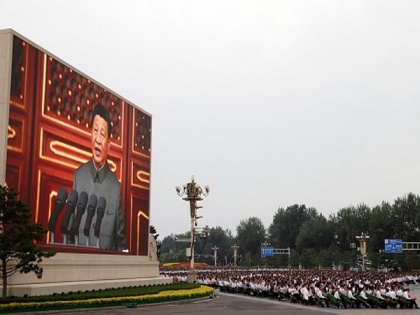'Chinese Communist Party's centenary represents dark moment for free world'
By ANI | Published: July 4, 2021 06:50 PM2021-07-04T18:50:12+5:302021-07-04T19:00:08+5:30
Though China is celebrating the 100th founding anniversary of the Chinese Communist Party (CCP) with great fervour, its atrocities against people from other countries highlight a dark moment for the rest of the world.

'Chinese Communist Party's centenary represents dark moment for free world'
Though China is celebrating the 100th founding anniversary of the Chinese Communist Party (CCP) with great fervour, its atrocities against people from other countries highlight a dark moment for the rest of the world.
During a speech at the CCP's centenary event, President Xi Jinping boldly proclaimed that "China will never allow any foreign force to bully, oppress, or subjugate us", which is ironical considering the CCP's foreign policy is built on a foundation of bullying, oppression, and subjugation, writes David Spencer for Taiwan News.
China's oppressive policies are used regionally, against small nations and large countries like Pakistan to ensure that a significant swathe of the world adheres to party lines. It is the same approach that is being carried out in Hong Kong, Xinjiang, Tibet and across China itself to keep any minority or dissenting voices in check.
Stressing that no other country intends to subjugate the Chinese people but want them to be free from the oppression they suffer under the CCP, Spencer said that July 1 should be a day of mourning for everyone in the free world.
"A century ago this week, one of the most dangerous, genocidal, totalitarian regimes in history was born," he wrote for Taiwan News.
Hitting out at its unspecified adversaries, Xi at the Community party centenary speech said any external attempts to subjugate the country would result in "heads bashed bloody against a Great Wall of steel."
The "heads bashed bloody" remark on Thursday garnered widespread attention, which later appeared to be softened in the government's own English language translation.
Meanwhile, one of the targets of the Xi-led regime is Taiwan, as Beijing continues to view Taiwan as an inseparable part of its territory even though the CCP has never governed the democratic island of around 24 million people.
"...No amount of pageantry can hide how devastating that would be for this country, its people, and the wider world," said Spencer.
In relation to Taiwan, Xi used two terms - "one country, two systems" and the "1992 Consensus".
According to Spencer, Xi is still labouring under the delusion that the "one country, two systems" model could still work for Taiwan, despite the fact that it has been totally discredited by his regime's annexation of and subsequent abuses in Hong Kong.
While the term '1992 Consensus' is used in Sino-Taiwanese relations, it is a completely inaccurate term as no consensus was arrived at between the two sides. However, in recent years, as Taiwan grows ever more distant from China, the CCP has decided that the "1992 Consensus" is one of their red lines, Spencer wrote for Taiwan News.
No political party has killed more people than the CCP, according to former US Secretary of State Mike Pompeo.
"If the West wants to find a suitable way to mark the 100th anniversary of the CCP, it will take steps to ensure that the brutal regime is not able to spread its poison any further or cast its shadow over humanity for another 100 years," wrote Spencer.
Pew Research Center recently conducted a survey among the 17 biggest economies of the world-- in Europe, North America and the Asia-Pacific region--which gave extremely negative views about China.
The study showed that whereas last year negative views of both countries were at or near historic highs, confidence in the US president has shot up precipitously since Joe Biden took office, while confidence in President Xi Jinping remains unchanged and near historic lows.
Ratings for the Chinese President have been consistently low in many countries, particularly across the Western European nations surveyed, since this question was first asked in 2014.
( With inputs from ANI )
Disclaimer: This post has been auto-published from an agency feed without any modifications to the text and has not been reviewed by an editor
Open in app